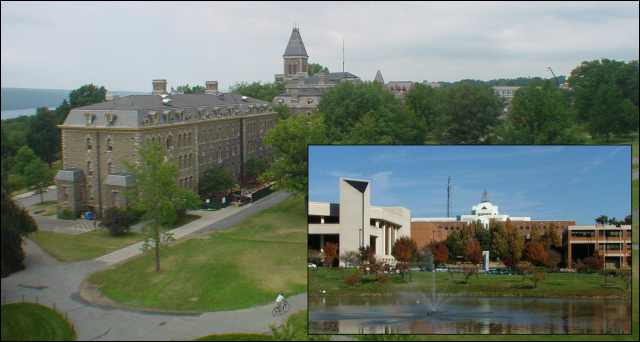|
Home
|
THE FILM
|
Interviews
|
About |

The expertise at the foundation of The Anthrax Diaries: An Anthropology of Biological Warfare and its featured documentary came from ten years of research by Sonia Ben Ouagrham-Gormley and Kathleen M. Vogel. The genesis of this Web site can be traced to the day in May 2010 when Ben Ouagrham-Gormley and Vogel introduced Slava Paperno to Gennadiy Nikolaevich Lepeshkin, a former Soviet bioweaponeer. When Slawomir Grunberg expressed his interest in the project, and Dr. Lepeshkin agreed to participate in the documentary, the idea for the filming and the multimedia Web site began to turn into a plan. The site went live in the fall of 2011 and is still under construction, with much information to be added.
Sonia Ben Ouagrham-Gormley is an assistant professor at George Mason University (GMU) Biodefense Program. Prior to joining the GMU faculty in 2008, Ben Ouagrham-Gormley spent ten years working as a senior research associate at the Monterey Institute Center for Nonproliferation Studies (CNS) where her research focused on studying proliferation from former Soviet weapons scientists. In 1999-2001, Ben Ouagrham-Gormley was based in the CNS Almaty office in Kazakhstan where she conducted studies on the restructuring of the nuclear sector in Russia and on the conversion of bioweapons facilities in the former Soviet Union. In 2002-2005, she conducted a study of the Anti-Plague System of Central Asia and the Caucasus and participated in the Biological Weapon Proliferation Prevention program, under Cooperative Threat Reduction Program funded by the Department of Defense, which aimed to curb the proliferation threat from former biological facilities and scientists in Russia.
Slawomir Grunberg has directed and produced over 40 television documentaries. He is a winner of the National Emmy Award as well as numerous other awards at film festivals around the world, including awards for documentaries filmed in Russia. Slawomir's work has appeared on PBS stations in the United States and on Polish television. He has received multiple grants from the National Endowment for the Arts, the New York Council on the Arts, and the National Endowment for the Humanities. Slawomir speaks English, Polish, and Russian and has worked in Europe, Asia, and the Middle East. He owns and operates LogTV, Ltd., a film production studio in Ithaca, NY. His complete portfolio can be found at www.logtv.com.
Slava Paperno, in addition to working on this project, directs the Russian Language Program in the Department of Comparative Literature at Cornell University. He had written books for learners of Russian and produced numerous multimedia titles as well as an ethnographic multimedia Web site Communal Living in Russia at kommunalka.colgate.edu. Slava has co-produced, with Slawomir Grunberg, several documentaries that explore social issues in post-Soviet Russia. For his numerous projects, he has received major grants from the National Security Agency, the U.S. Department of Education, the National Endowment for the Humanities, and The Consortium for Language Teaching and Learning. His documentaries earned him an award from the American Association of Teachers of Slavic and East European languages.
Kathleen M. Vogel is an associate professor at Cornell University, with a joint appointment in the Department of Science and Technology Studies and the Judith Reppy Institute for Peace and Conflict Studies. Vogel holds a Ph.D. in biological chemistry from Princeton University. Prior to joining the Cornell faculty, Vogel was appointed as a William C. Foster Fellow in the U.S. Department of State's Office of Proliferation Threat Reduction in the Bureau of Nonproliferation. Vogel had also spent time as a visiting scholar at the Cooperative Monitoring Center, Sandia National Laboratories and the Center for Nonproliferation Studies, Monterey Institute of International Studies. Vogel had extensively collaborated with Sonia Ben Ouagrham-Gormley on Soviet bioweapons issues.
Several organizations and numerous individuals have supported our project in various ways. Dauren Aben (Даурен Абен) provided invaluable assistance for Slawomir's filming in Kazakhstan. Dastan Eleukenov, one of the authors of an important 1999 report on biological weapons in Kazakhstan, was instrumental in obtaining support from his colleagues at the Embassy of Kazakhstan in Washington to provide us with background information about Kazakhstan's outstanding nonproliferation efforts. Several former Soviet biological weapons scientists spent many hours or even days talking to us about their work. American scientists, researchers, and civil servants generously shared with us their time and expertise. Among them are Gary Crocker, David Franz, Anne Harrington, Milton Leitenberg, Richard Spertzel, and Andy Weber.
We are very grateful to our assistants for their help in transcribing our materials and conducting background research: Masha Bratischeva, Maria Elkin, Ksenia Kriksunov, Yekaterina Nikiforova, Alexandra Perepelova, Dan Veksler, and Xu Yang.
We wish to give special thanks to Elaine Scott, administrative manager, Reppy Institute for Peace and Conflict Studies at Cornell for her outstanding administrative assistance on this project.
English translations were done by Stephen Shabad (The Washington Interview) and Laura Esther Wolfson (the rest of the interviews). Interpretation services at public events: Julia Karpeisky.
See this recent article in Cultures (volume 1 issue 4 page 76) about the project.
Web site by Slava Paperno. Visual design by Thomasz "Mucha" Pracel.